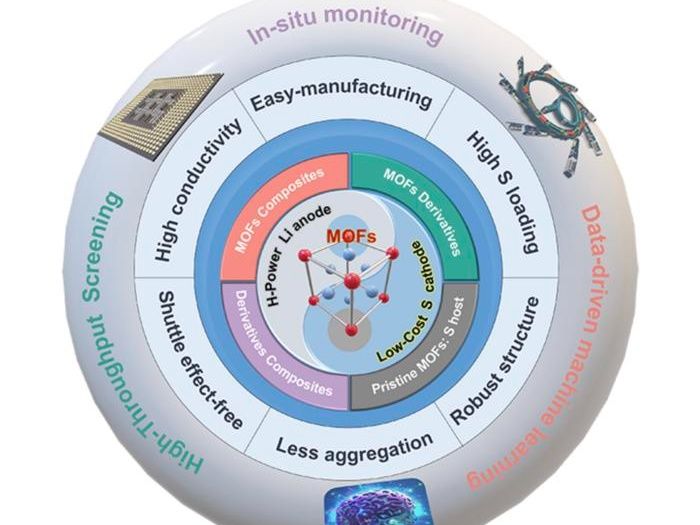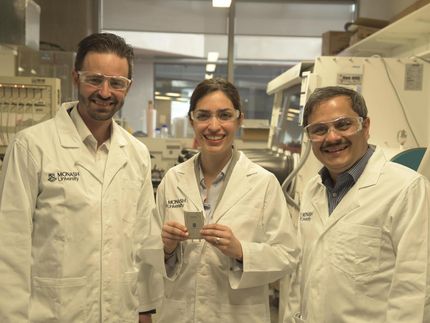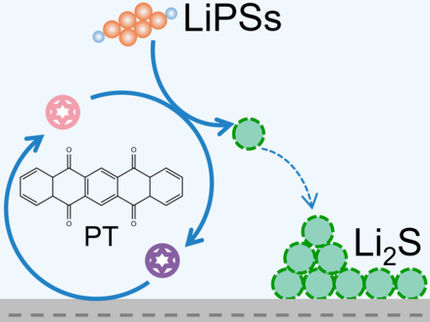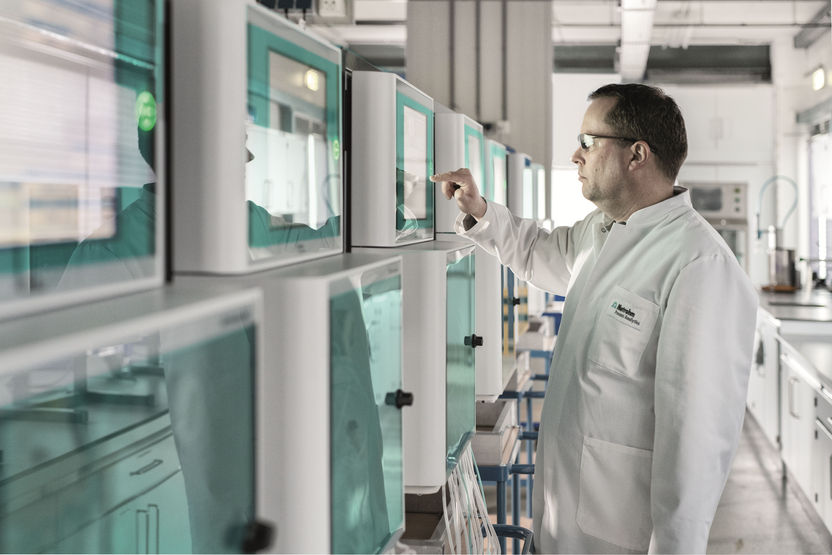Improving lithium-sulfur batteries with metal organic framework-based materials
Advertisement
Current lithium-ion battery technology does not have the energy density necessary to meet the demands for renewable energy. In theory, lithium-sulfur batteries could be a viable alternative with a higher specific capacity and energy density. However, sulfur has disadvantages that currently limit its practical adoption.

This graphic shows the benefits of MOF-based materials and their use in lithium-sulfur batteries, which have many advantages over current lithium-ion technology. Some advantages include easy manufacturing, high conductivity, and a robust structure that all improve the function of the lithium-sulfur batteries.
Weihua Chen, Zhengzhou University
A comprehensive review published in Nano Research on February 8 outlines how metal organic frameworks-based cathode materials could improve the performance of lithium-sulfur batteries, making them a practical alternative to lithium-ion batteries.
“The application of high-performance lithium-sulfur batteries is still impeded by some major issues, leading to unacceptable practical capacity and cycling stability,” said Weihua Chen, a researcher at Zhengzhou University. “First, sulfur’s poor electrical conductivity and those of the discharging products significantly increase some internal resistance of the batteries, limiting the utilization efficiency of the active materials. Also, severe volumetric expansion of sulfur cathodes after the lithiation process causes the structural pulverization of electrodes.” With these limitations, lithium-sulfur batteries have safety issues, as well as performance issues, that currently prevent their wide adoption.
Advanced sulfur cathodes made out of metal organic frameworks could be the solution. Metal organic frameworks are typically made up of a metal ion/cluster and have unique properties such as high porosity and adjustable pore size and controllable pore structure. Pristine metal organic frameworks have not yet been adopted into lithium-sulfur batteries because of poor electrical conductivity and insufficient structural stability; however, recent studies have shown how metal organic frameworks can be combined with conductive material, such as graphene, carbon nanotube, and some polymers.
“Because of the porous microstructure, ultra-large accessible specific surface area, and adjustable function group, metal organic frameworks-based materials have received the attention of investigators as potential cathode hosts for lithium-sulfur batteries and have made significant progress. Particularly, metal organic frameworks-related materials could effectively restrain the dissolution and diffusion of polysulfide in the electrolytes,” said Chen.
This review of published articles looked at pristine metal organic frameworks, different metal organic frameworks composites, and metal organic frameworks derivatives. These unaltered inorganic metal and organic components have crystallographic structure and show promise in storing the active sulfur, however most of them do not have the conductivity necessary for effective battery operation.
Metal organic framework composites enhance the properties of metal organic frameworks, improving the conductivity and reinforcing structural stability. Graphene, carbon nanotubes, and conductive polymers are all viable options for improving on the limitations of pristine metal organic frameworks. Another alternative is materials derived from metal organic frameworks, or metal organic framework derivatives. For example, metal organic frameworks-derived carbon materials can facilitate electron and ion transfers and solve the volume expansion problems found within the sulfur cathodes, but could compromise the structure of the metal organic framework. Research is ongoing into how these different materials could be improved and best-utilized in lithium-sulfur batteries.
Looking ahead, researchers are continuing to explore how metal organic frameworks-based materials and their unique features can improve the performance of lithium-sulfur batteries. “Metal organic frameworks-related materials are emerging as promising sulfur cathode materials for lithium-sulfur batteries. Despite significant progress in recent years, there still exist challenges to overcome for the commercialization of lithium-sulfur batteries. It will take time and effort to achieve practical application of metal organic frameworks-related materials in lithium-sulfur batteries, but this review could offer useful guidance for the future development of these materials,” said Chen.
Original publication
Other news from the department science
Most read news
More news from our other portals
See the theme worlds for related content
Topic World Battery Technology
The topic world Battery Technology combines relevant knowledge in a unique way. Here you will find everything about suppliers and their products, webinars, white papers, catalogs and brochures.

Topic World Battery Technology
The topic world Battery Technology combines relevant knowledge in a unique way. Here you will find everything about suppliers and their products, webinars, white papers, catalogs and brochures.



































































